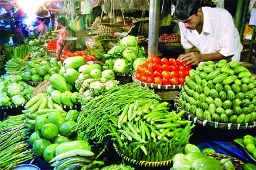 Food inflation rose for the third straight week to touch 17.94 per cent in January-end, fuelled by costlier potatoes and pulses, but the government was confident that prices of essential items would cool down soon.
Food inflation rose for the third straight week to touch 17.94 per cent in January-end, fuelled by costlier potatoes and pulses, but the government was confident that prices of essential items would cool down soon.
Food Inflation rose by 0.38 percentage points during the week ended January 30 from a week ago, prompting analysts to believe that the government may continue with the zero import duty regime for import of food items like wheat, rice, pulses, sugar and edible oils in the Union Budget later this month.
Inflation, which began easing after touching the decade's high of about 20 per cent in December, rose mainly because cost of potatoes and pulses were up 40.57 per cent and 41.24 per cent, respectively, from the year-ago level.
Meanwhile, RBI Deputy Governor Subir Gokarn today said food inflation is expected to moderate towards the year-end, but only "in the event of normal monsoon." Last week, Prime Minister Manmohan Singh too had said that food inflation will ease soon.
"...the worst is over as far as food inflation is concerned. I am confident that we will soon be able to stabilise food prices," he had said addressing the chief ministers' conference on food prices in New Delhi.
However, economists say that food inflation is a concern and along with fuel inflation, it is putting upward pressure on the overall inflation, which has already touched 7.31 per cent in December.
HDFC Bank economist Jyotinder Kaur said, "Food inflation has been a concern and coupled with fuel inflation, it is putting pressure on overall inflation. I expect overall inflation to touch 9.5 per cent by the end of this fiscal."
The index for fuel group rose by 1.2 per cent in the week due to higher prices of non-coking coal (15 per cent) and coking coal (11 per cent). On annual basis, vegetable prices increased by around 21 per cent, while wheat became dearer by over 15 per cent.
The price index for food articles, on the weekly basis, moved up 0.3 per cent on account of costly fruits and vegetables (2 per cent), while fish marine, spices, condiments and bajra became dearer by one per cent, respectively.
To tame inflation, the RBI, in its quarterly monetary review, had asked banks to keep aside more cash with them. It hiked cash reserve ratio (amount banks have to park with the apex bank) by 75 basis points to 5.75 per cent, which would suck out Rs 36,000 crore from the system.
Recently, an expert group headed by Kirit Parikh suggested freeing of petrol and diesel prices and raising LPG rates by Rs 100 per cylinder and kerosene by Rs 6 per litre.
Freeing petrol and diesel prices would result in an increase of Rs 3 per litre in petrol and Rs 3-4 in diesel prices, respectively.
If the suggestion of the expert group is accepted, the overall inflation could breach 10 per cent-mark by the end of this fiscal.






 © 2025
© 2025